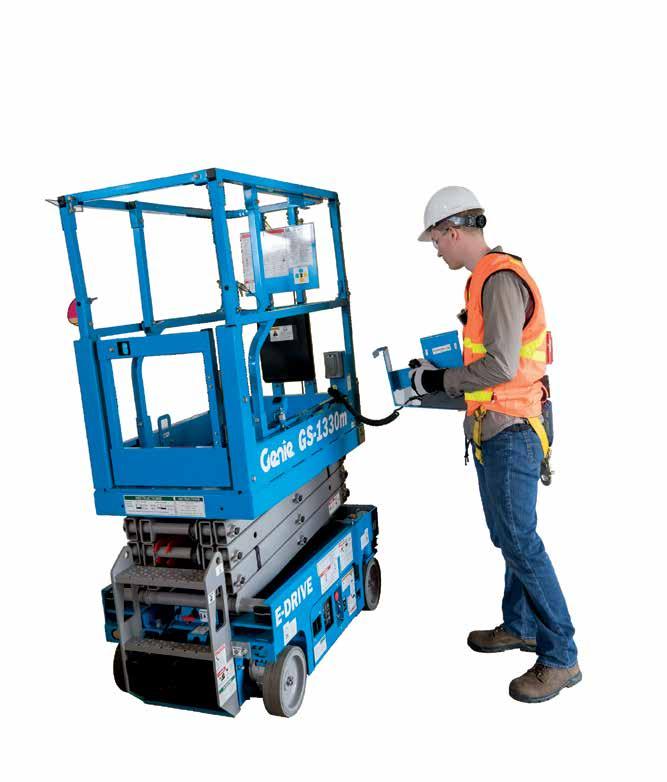Picking the Right E-Grocery Automation Technology
Cutting the Work Commute to be Sustainable
UPS›s Renzo Bravo talks SMB›s current Impact


Picking the Right E-Grocery Automation Technology
Cutting the Work Commute to be Sustainable
UPS›s Renzo Bravo talks SMB›s current Impact


Logistics News ME finds out how logistics companies in the region have been coping with the COVID-19 pandemic

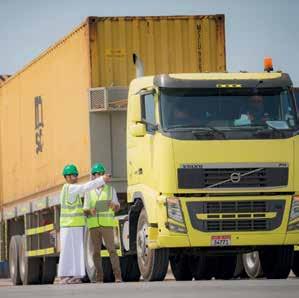



















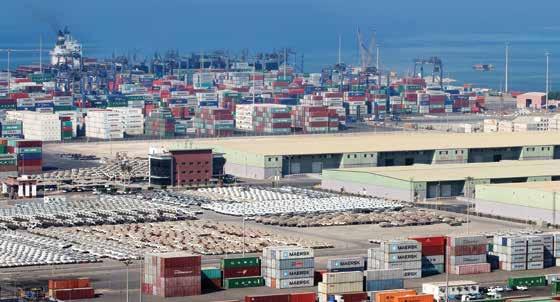




Your window to expand. Introducing Business POS for cashless payments with better transaction rates.
du.ae/business-pos



Saudi Arabia has seen an increase in demand for E-Commerce, according to a report published by the Oxford Business Group. Restrictions on movement and trade as a result of the Covid-19 pandemic have led to a significant shift in consumer behavior in Saudi Arabia, with locals increasingly turning to digital channels.
Despite the comparatively limited medical impact on the Kingdom, the threat presented by the virus – alongside efforts to maintain social distancing – has led to a significant shift in lifestyle and consumer habits, with e-commerce experiencing a rapid spike in growth.
In late March local online retailer BinDawood Holding told local media that, since the escalation of the Covid- 19 crisis, its average sales on a


10-day basis had increased by 200%, while its average order value rose by 50% and app installations by 400%.
Elsewhere, fellow Saudi grocery delivery app Nana has also benefitted from the recent turn towards online shopping, raising $18m in a Series B funding round in late March to expand operations across the Middle East, with investors including venture capital funds Saudi Technology Ventures and Middle East Venture Partners. This follows a Series A funding round that raised $6m last year.
Looking ahead, retailers may need to adapt their supply chains in response to shifting market dynamics.
Kasun Illankoon Editor, Logistics News Middle East
Director Rabih Najm rabih@bncpublishing.net
Business
Editor Kasun Illankoon kasun@bncpublishing.net




Red Sea Gate Terminal (RSGT) has significantly expanded its operational capabilities and capacity at Jeddah Islamic Port. Today marks the official commencement of RSGT’s take-over of operations in the northern section of Jeddah Islamic Port (previously known as North Container Terminal, or “NCT”). A new 30-year concession agreement for the existing north port facility concluded at the end of last year between RSGT and the Saudi Arabian Ports Authority, (Mawani), calls for $1.7 billion of investment in infrastructure, equipment and technology by 2050, with annual container throughput capacity growing to 8 million TEUs.
“As we begin operations at the northern part of Jeddah Islamic Port today, we are very proud to commemorate this tremendous milestone of the RSGT growth strategy, demonstrating our ongoing and long-standing commitment to expansion, modernization, and worldclass terminal services,” stated RSGT CEO Jens O. Floe.
By 2023, the expanded RSGT, covering an area of 1.5 million square meters, will have increased annual container throughput
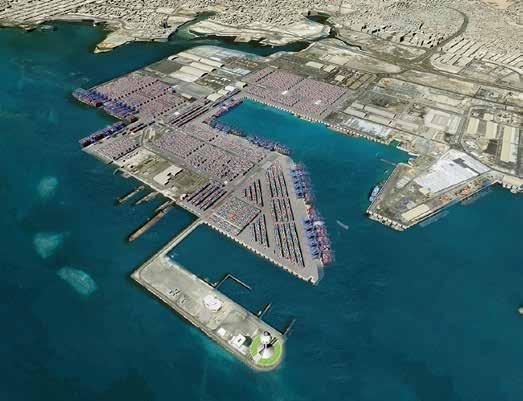
capacity to 5.2 million TEUs. Already able to accommodate Ultra-Large Container Ships (ULCS) of 20,000 TEU class and above, at the end of the first three-year phase of investment, RSGT will be equipped with 24 Super PostPanamax quay cranes, 67 Rubber-Tyred Gantry Cranes (RTGs), and will offer 4,900 Reefer plugs.
“This carefully planned program of growth and investment will firmly establish RSGT as the largest logistics gateway, and the busiest container terminal, in Saudi Arabia, and on the Red Sea,” said Mr. Floe.
Red Sea Gate Terminal has already signed an Islamic financing agreement with Banque Saudi Fransi and Al
Rajhi Bank for the project.
“We are looking forward to executing this outstanding project and thank the Government of The Kingdom of Saudi Arabia, The Ministry of Transportation and Mawani for their foresight and trust in our ability to continue to bring excellence to the trade” stated RSGT CEO Jens O. Floe.

Etihad Rail board members confirmed that the O&M facility in Al Faya contract, valued at AED 864m, had been awarded to a joint venture led by VINCI Construction France, in line with the company’s future strategy to provide a railway network that supports and strengthens the long-term growth of the national economy.
The decisions was made
at a remote meeting chaired by H.H. Sheikh Theyab bin Mohamed bin Zayed Al Nahyan, Member of the Executive Council, and Chief of Abu Dhabi Crown Prince’s Court.
During the meeting, H.H. Sheikh Theyab also carried out a virtual visit of the construction site in Saih Sheib region, and launched the civil works on Package B of Stage Two of the UAE’s
national railway network project, which is developed and operated by Etihad Rail with the aim of placing the United Arab Emirates among the best countries in the world in terms of transport quality.
Etihad Rail has now awarded all civil works and construction contracts for Stage Two of the national railway network. The company has also launched
construction on Package A of Stage Two, signed a contract for the construction of a series of Freight Facilities centres, and awarded a contract for the supply of locomotives to expand the company’s fleet to 45, underlining the fact that Etihad Rail is progressing at a strong and steady pace towards completing one of the largest and most important infrastructural projects in the UAE.

Tristar Group, the global integrated energy logistics company, is pleased to announce that its joint venture United Stars in the Kingdom of Saudi Arabia (KSA) has signed a five year contract with Linde-Sigas, a majority owned subsidiary of Linde in KSA and leading manufacturer of industrial and medical gases.
Tristar’s mandate will be to transport these products to Linde-Sigas´ diverse portfolio of clients throughout KSA from five centrally located depots in Dammam, Jeddah, Riyadh, Jubail, and Yanbu. The initial contract is for five years with the option to extend on completion for an additional two years.
Eugene Mayne, Group CEO of Tristar said: “I am delighted to announce our expanded agreement with Linde-Sigas, which is testimony, once again, to our expertise in energy logistics as we continue to grow and

expand our blue-chip client base in Saudi Arabia. LindeSigas is one of Tristar’s longstanding partners in other Gulf markets, so we are particularly pleased that we can provide them with a comprehensive endto-end logistic solution for KSA. Our business continues to grow steadily and, with a global presence in more than 20 countries today, I look forward to reporting on further business developments in due course.”
The contract was signed by Linde-Sigas´ General Manager, Mr. Mehdi Benzaari, and United Stars’ KSA Country Manager, Mr. Aous Ali, at a signing ceremony that took place at United Stars’ headquarters in MODON, Dammam second industrial area. The ceremony was attended by Zubair Siddiqui, Yameen Younus and Mishari Alomiri of Linde-Sigas, and Paul Vincent and Anoop Palatty of United Stars.
SAFEEN, Abu Dhabi Ports’ maritime service arm, has announced a successful acquisition of a Post Panamax bulk carrier, making it largest vessel ever to join its inventory.
Built in Romania and in service since 2006, the vessel will operate under the name “HAFEET” and will initially undergo an extensive conversion, prior to commencing operations.
The refitting will include state-of-the-art cranes and conveyor system, which, when combined with other design parameters, will render the vessel a potent and efficient transhipment platform, enabling SAFEEN to provide solid bulk cargo transhipment services.
Once its conversion is fully complete in the latter part of 2020, M/V HAFEET will be based at Musaffah and will be tasked with supporting Emirates Steel’s transhipment requirements. Commencing its operations in January 2021, the vessel will assist in discharging bulk iron
ore bound for Emirates Steel from incoming bulk carriers more efficiently, thereby economizing the turnaround time for the large ocean-going vessels.
Captain Adil Banihammad, Head of Maritime Cluster & Chief Executive Officer, SAFEEN – Abu Dhabi Ports, said: “The acquisition and the eventual commissioning of HAFEET marks a significant step for our SAFEEN team as it greatly enhances our ability to serve our customers and provide them with worldclass maritime services. Even more importantly, however, the vessel is part of a larger expansion strategy by Abu Dhabi Ports aimed at broadening our portfolio of services, and taking our experience and service excellence to the wider bulk transshipment market. We firmly believe that by challenging ourselves and looking beyond our horizons, we will benefit not only our current and future customers, but also our broader emirate as well.”

The UPS Board of Directors today announced it has named Carol Tomé as UPS Chief Executive Officer, effective June 1. David Abney, the current Chairman and Chief Executive Officer, will remain in his role until June 1 when he will become Executive Chairman of the Board. He will retire from the UPS Board on September 30. In order to ensure a smooth transition and successful peak season, Abney will remain as a special consultant through the end of 2020 and then retire after 46 years of UPS service. On September 30, William Johnson, UPS Lead
Independent Director, will assume the role of NonExecutive Chairman.
“After a rigorous selection process involving both internal and external candidates, Carol was the clear choice,” said Johnson, who also serves as Chair of the UPS Nominating and Corporate Governance Committee and is a member of the Executive Committee.
“Carol is one of the most respected and talented leaders in Corporate America and has a proven track record of driving growth at a global organization, maximizing shareholder value, developing talent and successfully executing against
strategic priorities,” said Johnson. “As a member of the Board and Chair of the Audit Committee, Carol has in-depth knowledge of UPS’s business, strategy and people, and is the right executive to lead the company at this important time in its transformation.”
Johnson continued, “We congratulate David on a truly exceptional career at UPS. He has undertaken bold actions to place UPS at the forefront of the transportation industry and position its global network and people to capitalize on emerging trends that will carry the company well into the future.”
“UPS has been one of my life’s passions and through UPS I have been able to live the American dream,” said David Abney. “I am proud to have worked with UPSers to prepare this great company for its next 100 years. I am confident in the UPS management team and their capabilities to execute our strategies in the future. This is the right time for me to pass the baton. I am extremely pleased for Carol and know she is the best choice to lead the company. She understands UPS’s culture and values, is a strategic leader and possesses a customer-first mindset.”
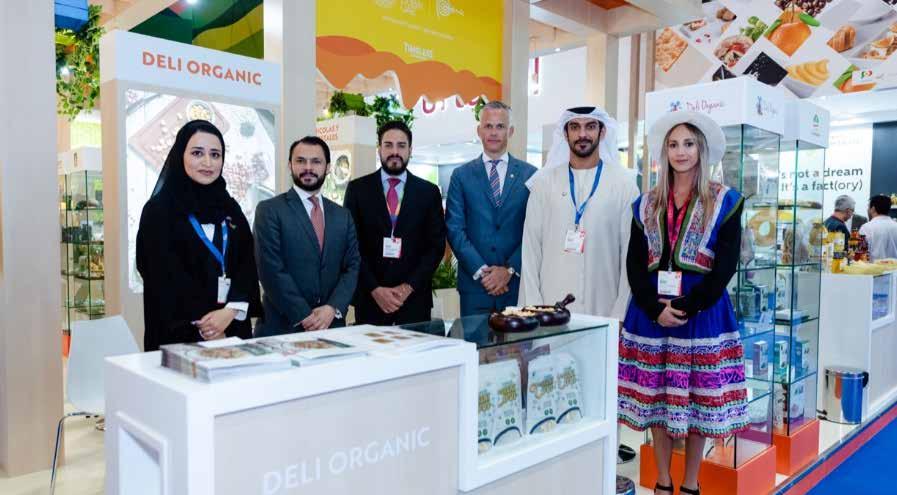
DP World, UAE Region, the UAE’s leading logistics and business hub operator, announced Deli Foods Peru has joined the Latin American (LATAM) Incubation Centre at Jafza One, the flagship commercial complex located at the heart of Jebel Ali Free Zone (Jafza).
The agreement was signed at Gulfood 2020, and marks Deli Foods as the first Latin American company to join the incubation centre, a leading initiative for international SME investors wanting to set up business in Jafza and explore regional markets.
DP World operates fully integrated maritime and logistics services in Peru, a container terminal at the Port of Callao, catering to customers across the entire
supply chain. DP World Callao, like Jebel Ali Port with its technology-driven, cost-effective operations, high productivity and interregional transshipments, acts as a gateway for Peru’s imports and exports.
Mohammed Al Muallem, CEO and Managing Director, DP World, UAE Region and CEO of Jafza, said: “Cooperation between DP World, UAE Region and Peru is based on a joint strategy focused on increasing connectivity, logistical integration and internationalisation of companies. For Latin American companies like Deli Foods, the choice of Jafza is simple and obvious: One Location, Multiple Markets. The benchmarks
we set help us guide our incubator partners in doing business from Jafza. Our strategy of enabling smarter global trade in Peru is an optimum illustration of what we do at our flagship facilities in Dubai.”
The LATAM Incubation Centre, strategically located in Jafza One, offers the most advanced, cutting edge business facilities that enable companies to collaborate and achieve returns on their investments with fewer tax and other logistical hurdles.
Alvaro Silva Santisteban, Director – Trade, Tourism & Investment Office of Peru in the UAE, said: “The signing of this strategic deal is another milestone within our longstanding relationship with DP World, UAE Region. Our
objective now is to leverage all the advantages of the Latin American (LATAM) Incubation Centre, especially when considering our exports to the UAE in 2019 reached the US$ 1 Billion barrier”
Bruno Quesada Carrasco, General Manager, Deli Foods Group FZCO said: “Being part of the Latin American (LATAM) Incubation Centre will give Deli Foods a leading competitive edge in the regional markets. From Jafza One located close to Expo 2020, where Peru will have an outstanding participation, we plan to increase our opportunities for expansion. Having previously worked with DP World through its Peru operations, we are reassured about the high level of support services we can expect.”
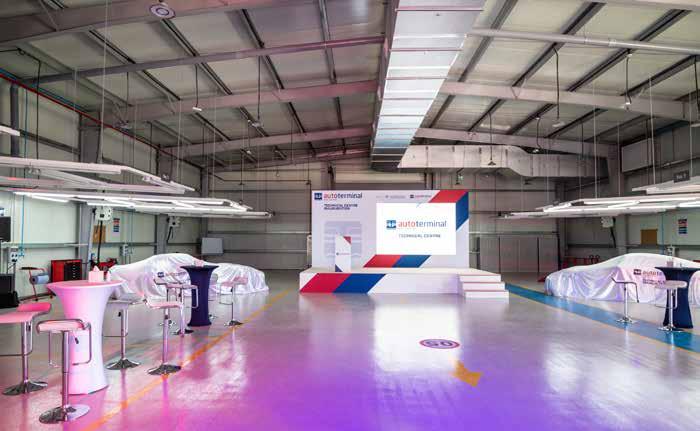
Autoterminal Khalifa Port, a joint venture between Abu Dhabi Ports and Autoterminal Barcelona, the operator of the advanced RoRo terminal at Khalifa Port, has unveiled an all-new technical centre aimed at diversifying the portfolio of services on offer to customers.
As the first facility of its kind in the region, the centre provides a wide range of value-added services for customers within the Middle East’s automotive market. From pre-delivery inspection to accessory fitting, automotive importers stand to benefit from reduced labour and transportation
costs, as vehicles can be prepared for showroom display or the receiving consignee without needing to visit a third-party facility.
Saif Al Mazrouei, Head of Ports Cluster at Abu Dhabi Ports said: “Since its founding in 2018, Autoterminal Khalifa Port has quickly established itself as one of the leading choices for automotive distribution moving to and from the Gulf.
“Managed by a dedicated team committed to innovation, Autoterminal Khalifa Port has not only flourished in the market, but has become a role model for others in the industry to
follow. The new Technical Centre is a culmination of that continuous drive for improvement and opens new opportunities for our customers to benefit from.”
Pierre Algeo, CEO of Autoterminal Khalifa Port, said: “Furthering our directive to become the leading distribution hub for automotive vehicles from East Asia, the launch of our new technical centre opens new opportunities for our customers.
“Using our centre, clients will be able to conduct any necessary modification prior to final delivery streamlining their respective operations and achieving improved costsavings. We are delighted to be
the first in the region to offer this added benefit directly within our terminal.”
The new technical centre is the latest addition to Autoterminal Khalifa Port and expands the already extensive capabilities of the platform, which is considered the ideal Ro-Ro terminal in the GCC. Featuring pollution free storage for up to 15,000 vehicles, Autoterminal Khalifa Port offers multimodal solutions for automotive customers looking to either import vehicles to the UAE or distribute from the Middle East to East Africa and Western India.




Maqta Gateway, developer and operator of the first Port Community System in the UAE and a wholly-owned subsidiary of Abu Dhabi Ports today announced the launch of Industrial Zone Services through its pioneering Single Window platform, in partnership with ZonesCorp, the UAE’s largest operator of purpose-built Economic zones.
A development that comes in continuation of Maqta Gateway’s achievements throughout the past five years, in providing services to leading companies including KIZAD, Abu Dhabi Terminals, CSP Abu Dhabi Port Container Terminal (COSCO), Autoterminal Khalifa Port and SAFEEN –Abu Dhabi Marine Services, in addition to partnering with
The General Administration of Customs in Abu Dhabi to provide digital customs services across sea ports.
Commenting on this development, Dr. Noura Al Dhaheri, Head of Digitalization Cluster at Abu Dhabi Ports and CEO of Maqta Gateway said: “We are pleased to collaborate with ZonesCorp to enhance customers experience by providing digital services that will play a major role in optimising processes and significantly reducing paperwork, administration and processing times. We are committed to providing innovative solutions to our customers and continue to explore ways to facilitate trade in Abu Dhabi and contribute towards its sustainable economic development plans.”

GP Global announced the expansion of the group’s bunkering portfolio with the launch of its new bunkering operation in the port of Jebel Ali. Jebel Ali Port, operated by DP World, contributes over 26 per cent to Dubai’s GDP and along with Jebel Ali Free Zone (JAFZA) provides Dh151 billion ($41.1 billion) or 10.7 per cent to the UAE’s national GDP making it a key player in the development of the UAE economy.
GP Global’s new bunkering operation includes two wholly owned barges, each with a capacity of 4,800 MT of fuel
oil and 1,000 MT of gas oil, which will deliver MAROPOL and ISO-compliant distillate marine, including high quality marine gasoil (MGO) grades such as DMA and DMB as well as residual fuels including RMG and RME grades. Subsequently, GP Global will continue to champion the bunkering industry’s needs for ISO-compliant low sulphur grades, working closely with its customers and partners on cleaner energy solutions.
The new Jebel Ali bunkering operation of GP Global complements its operations in the UAE at the
Port of Fujairah, where it had set a group milestone by completing its first delivery of IMO compliant fuel oil, three months ahead of the January 2020 deadline.
The group’s entire bunkering operations in the UAE –including Dubai and Fujairah – is supported by GP Global’s trucking business to cover fuel oil and marine gas oil in major ports in the country.
Anil Keswani, Head of Bunkering, East of Suez at GP Global, said: “Our East of Suez business has reported a growth of over 25 per cent last year in revenue,
which underlines the strong opportunity and potential of the region. With our new bunkering operation at Jebel Ali Port, we are not only consolidating our strengths in the bunkering business by continuing to invest in our physical presence in all major international ports, but also demonstrating our commitment to building a robust and reliable supply chain to meet customer needs. With this, we now offer a global network that can meet the requirements of marine fuel supply as per IMO guidelines.”
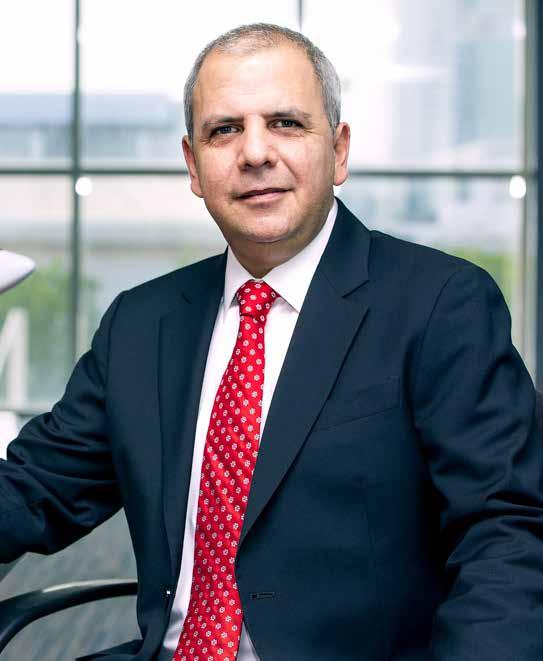
Kasun Illankoon spoke to Renzo Bravo, Head of Strategy and Marketing for Indian subcontinent, Middle East and Africa (ISMEA), UPS, regarding UPS’s recent SMB survey findings.
UPS announced the findings of a survey which captures current shipping behaviors and trends among small and medium businesses in the UAE and across the GCC.
The survey also demonstrates the current opportunities and challenges within the logistics sector for SMBs amidst the e-commerce landscape, the increasing digitalization and the preferences of customers.
We talked to Renzo Bravo, Head of Strategy and Marketing for Indian subcontinent, Middle East and Africa (ISMEA), UPS to find out what these results mean for SMB’s in the region.
When you consider that SMBs now generate over half of the UAE’s gross domestic product, you quickly understand UPS’s goals in gaining insight on how to better serve their growth needs with a smart global logistics network that moves 3% of the world’s GDP daily. UPS commissioned UAE-based SME10X to conduct a survey evaluating the current shipping behaviours among SMBs in the UAE and across the GCC. The survey was conducted to gain deeper insights into the shipping and logistics needs of these businesses given the evolving ecommerce landscape, increase in
digitalization, and growing customer demands.
We covered a large sample of more than 5,000 SMBs in the GCC across key sectors including manufacturing, services and trading, and analysed the results based on the participation of 1,153 respondents.
Our survey reiterates that technology and digital transformation will continue to play a critical role in the future of e-commerce and trade. As SMBs seek more services from their logistics partners to fulfil orders from e-commerce customers, it is apparent that there is an opportunity to tap into this growing marketplace.
Consequently, given their often limited resources compared to larger competitors, small businesses must work smart by using data and technology to understand their customers’ needs, expand their services and select the right partners to meet the requirements of the demanding online shopper.
The results also reflect an opportunity to provide an enhanced customer experience. In the survey, 50% of the SMBs say their customers prefer the option of free returns, giving them the freedom to choose whether they like the product or not. This echoes a global sentiment of online
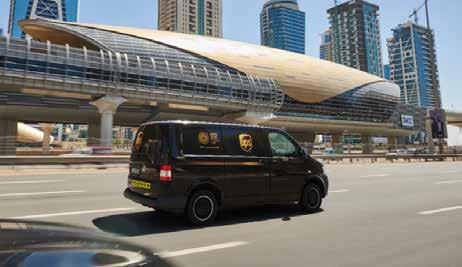
shoppers looking to make purchases from companies that offer value-added services.
Some key findings from the survey include the expectation from SMBs that their provider offers capabilities such as same-day delivery (69%), a time-definite delivery option (77%) and a digital application to track deliveries in real-time (62%).
This suggests that a majority of small businesses understand that the capabilities of their logistics partners are as important as their own in shaping their e-commerce strategy, and can help them become or remain competitive in the global marketplace.
And, with a growing number of small businesses offering online sales, there is a greater need to work with logistics providers who are able to keep pace with the technological requirements and demands of a fast-changing online world. Companies also increasingly expect their logistics partners to not only offer a variety of shipping options, but also customs brokerage and reliable visibility.
The e-commerce market in MENA has the potential to grow 3.5 times by 2022, reaching a total market size of $28.5 billion. Governments in the Middle East have also taken great efforts to support this crucial segment of the market. Dubai, for instance, has set ambitious development goals in the 50 Year Charter including the establishment of the world’s first virtual trade zone targeting 100,000 companies. Such initiatives offer exceptional opportunities for businesses, and especially SMBs, to thrive in the e-commerce market.
With a growing number of full-service providers and technology solutions to facilitate the online journey, it is becoming easier for companies to get started in e-commerce. To enable the further growth of the e-commerce market in the region, businesses must be aware of the
changing customer expectations that are driving global e-commerce trends, how they apply to the business, and what can be done to successfully adapt.
BASED ON THE SURVEY 64% OF SMBS CURRENTLY DO NOT OFFER ONLINE SALES: WHY IS THAT AND DO YOU SEE THAT CHANGING IN THE NEAR FUTURE?
SMBs might perceive the world of e-commerce as fragmented and complex, with multiple risks and as yet, undefined rewards, and this uncertainty could explain why an astounding 64% of SMBs surveyed do not currently offer online sales. Additionally, SMBs may feel that they do not have the necessary tools and support to meet increasing customer demands, requiring businesses to fulfil same-day delivery, offer an easy return policy and provide the ability to track deliveries in real-time.
We are confident that SMBs will adapt and incorporate online sales into their business strategy in the near future. This is because in today’s highly competitive market, businesses must meet consumer demand by making products available through an increasingly seamless online and brick-and-mortar retail experience.
The success of small businesses in offering online sales and entering the e-commerce space lies in the strength of their logistics providers. To facilitate the growth of this crucial sector, and enable the adoption of e-commerce on a larger scale, logistics providers must support SMBs with the tools to operate across different online marketplaces, manage and control product returns according to their own customized policies, while offering their customers day definite delivery information and detailed tracking status updates.
FOR UPS, WHAT LESSONS WERE LEARNED FROM THIS SURVEY AND HOW WILL IT HELP YOU TO IMPROVE YOUR SERVICES?
At UPS we create tools, technologies, and solutions designed to help SMBs improve their customer experience, enabling them to operate more efficiently and compete in the global marketplace. We are committed to the success of SMBs in the Middle East and are helping them grow and scale their operations to meet customer needs. We help our small business customers improve their customer service and streamline existing business processes so they can focus on what they do best: manufacturing and selling their products. Small businesses are the backbone and the future of the Middle East economy, and UPS will help ensure that it’s a very bright future.

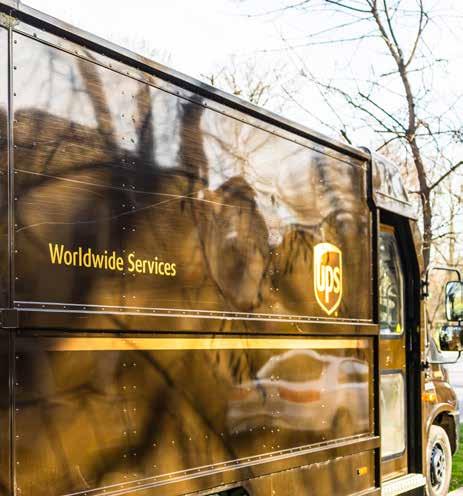
It can be borrowed - from future generations - or it can be earned from each and every aspect of your operation through a consistently focused and forward thinking mindset. That mindset is a vital part of the Scania DNA - and we’d like to pass it on to you. For more information about our new generation trucks and services, please visit scania.com/ae


By Alain Kaddoum, General Manager, Swisslog Middle East

In an ideal scenario, any retailer would love to see a surge in demand, but since the outbreak of COVID-19, panicked shoppers have emptied the grocery shelves, leaving the supermarket industry strained almost to the breaking point and with the staff not being able to keep up.
E-commerce grocery sales have risen far faster than in-store sales, rising 15% yearover-year. A new Gordon Hasket Research Advisors survey released March 13 found that one-third of shoppers purchased food online over the past week, with a significant 41% of them being first-time online food and grocery shoppers. A lot of supermarkets are anticipating this to be the norm in the future as it has given many previously reluctant shoppers a taste of the convenience and ease of ordering groceries online.
Estimated to reach $100 billion by 2022, the e-grocery service market presents unique challenges for a sector that’s racing to find the most efficient way to harness its fastest-growing opportunity. The grocery industry is throttled by persistent labor shortages, traditional fulfillment models, and last-mile delivery challenges. Expanding at an annual growth rate of 13%, online grocery sales have sent a lot of companies back to the drawing board to figure out how to get their piece of this burgeoning pie.
To keep up with the demand, e-grocers need solutions that enable fast, economical approaches for the buy online/pick up curbside or home delivery trend. The automated warehouse solutions and the right automation technology at the supermarkets can help grocers move their e-grocery fulfillment beyond manual picking. Logistics automation special-

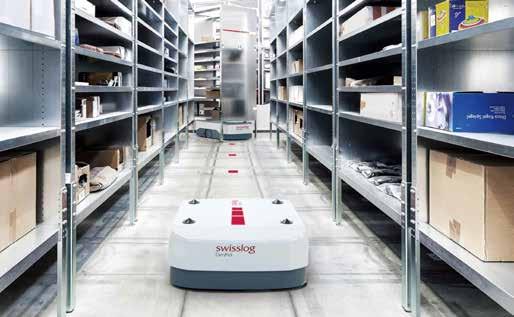

ists like Swisslog offer a range of automation solutions for grocers to choose from to fit their e-fulfillment strategy.
The flexible, data-driven and robotic solutions such as a hub-and-spoke arrangement, a bolt-on store automation approach, microfulfillment centers or a fully automated grocery store; enable grocers to meet rapidly changing customer demands while allowing them to leverage new technologies as they emerge.
Hub-and-Spoke arrangement enables automated fulfillment center to assemble orders for all non-perishable items and then bulk ship to the stores where they are topped off with perishable items allowing the fulfillment facility and automation system to be designed handin-hand and eliminates the space limitations imposed by integrating automation into existing retail locations.
Bolt-on Store Automation uses compact, robotic automation technologies, to create small fulfillment centers at the back of the store that automate current manual processes for nonperishable item picking while utilizing store inventory to top off orders with perishable goods, which allows them to fill complete orders from one location, reducing transportation time and costs.
Micro-fulfillment centers create an opportunity to convert abandoned or underperforming retail outlets into micro-fulfillment centers that serve the same area as a traditional grocery store with automated fulfillment for curbside pickup or home delivery. This strategy sacrifices in-store shopping so is particularly attractive to pure-play e-grocers but creates the opportunity to optimize the environment by efficiently integrating automated and manual picking. It allows grocers who don’t have an existing brick-and-mortar footprint within a particular area to move fulfillment closer to customers to reduce transportation costs and enable shorter delivery times.
The Automated Grocery Store is a new type of grocery store that combines automated efulfillment with traditional shopping. Still an emerging concept, it integrates automation into the shopping environment allowing shoppers to have the flexibility to place their orders in advance or while in the store and can choose to pick their own perishable and specialty items or have the store complete their order for pickup or delivery.
E-Grocery Automation Technologies, as in
other distribution operations, groceries have a range of automation solutions to choose from. The best solution will depend to a degree on the selected e-fulfillment strategy, but as with e-commerce automation in general, grocers should seek out solutions that are flexible, data-driven and robotic to ensure they won’t become obsolete as the market changes and can leverage new technologies as they emerge.
There are multiple niche solutions being developed today to capitalize on the growth in e-grocery fulfillment, the primary automation solutions being used or considered are either robot-assisted picking or goods-to-person automation systems.
Goods-to-person picking is a concept that has been widely adopted in e-commerce and multi-channel warehouses to enable higher productivity and faster order fulfillment times. Instead of pickers walking up and down warehouse aisles to pull orders, the goods-to-person system allows the picker to remain stationary, with an automated storage and retrieval system delivering the products they need to fulfill the next order as it is needed. Pick time is thus reduced significantly, and accuracy is improved, while pickers experience less fatigue.
Another approach is robotic-assisted picking in which a robot guides the picker through the store to optimize travel based on the location of the items to be picked and allowing multiple orders to be picked at the same time. The robot leads the shopper through the aisles in the most efficient manner and even guides the picker on how to package the order, determining which SKUs should be put into which grocery bag based on criteria such as the maximum weight for a bag, crushability and whether items need to be segregated by temperature.
While there are multiple options to use the existing store network to support e-grocery fulfillment, automation is required to provide the necessary productivity and speed. Working with an experienced integrator with automation control integrated into the WMS platform, helps ensure e-grocery fulfillment automation is implemented in the most efficient manner possible and delivers the desired performance.
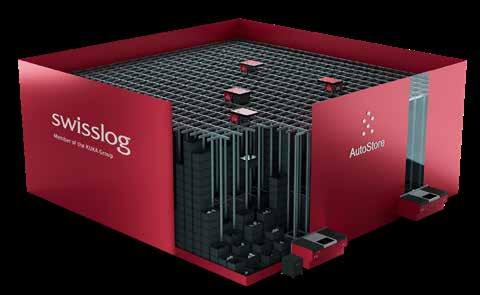
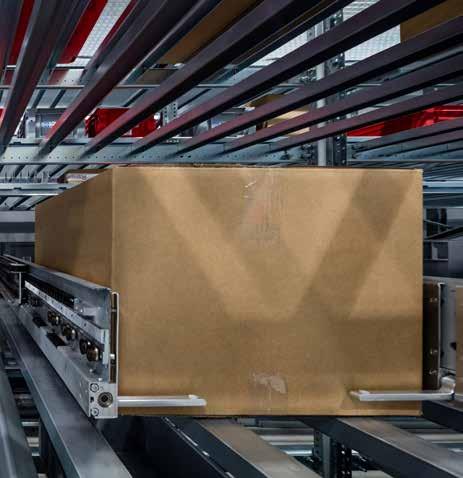

New Quester’s flexibility makes it suitable across a variety of applications and segments such as general cargo, long haul and construction.
And now, ESCOTs’ added power and performance in New Quester means assignments can be carried out with increased fuel and driver efficiency.
Optimized specifications such as reduced tare weight allow you to carry more. And with the introduction of smart new connected features such as telematics, you can stay on top of your tough daily schedule.
A smart move for your business


The COVID-19 pandemic is impacting global health product supply chains, affecting key materials and ingredients, finished health products, logistics, shipping, stranded passengers, and more. Logistics News ME finds out how logistics companies in the region have been coping with the COVID-19 pandemic

Bahri, a global leader in logistics and transportation, has announced that its Board of Directors has recently approved a donation of SAR10 million to Saudi Arabia’s Ministry of Health (MoH) to support its initiatives to fight against the spread of the coronavirus (COVID-19) disease in the Kingdom.
Commenting on this, Mohammed Abdulaziz Al-Sarhan, Chairman of Bahri, said: “Given the current global situation and challenges resulting from the spread of the coronavirus pandemic, Bahri is pleased to express gratitude to the Custodian of the Two Holy Mosques King Salman bin Abdulaziz and to H.R.H. Crown Prince Mo -
hammed bin Salman. We also extend our appreciation to the government sectors in general, and the Ministry of Health in particular, for their round-the-clock, tireless efforts to ensure the safety and health of citizens and residents of Saudi Arabia.”
Al-Sarhan added: “Underlining its social responsibility commitment to cooperating all entities in the Kingdom to strengthen the national efforts and support the government during this period, Bahri decided to donate SAR10 million to back the initiatives of the Ministry of Health to contain the outbreak. We are also pleased to place our expertise, maritime fleet, logistics services, and offices
around the world at the disposal of the Ministry, to help achieve the common national goal of preserving public health.”
Bahri has taken all the necessary precautionary measures to ensure the safety of its employees at its offices and onboard vessels. With its robust business continuity plans in place, the company is operating as normal to deliver on its commitment to its customers around the world and to ensure that they receive the highest quality service without disruption. As it continues to evaluate the situation, Bahri is also keen to implement further instructions and preventive measures being issued by the government of Saudi Arabia.
On Monday 30 March 2020, an Emirates SkyCargo flight carrying close to 500,000 Covid-19 testing kits landed at Sao Paulo airport in Brazil. The kits were moved from Guangzhou via Dubai by the air cargo carrier on the first of two such flights operated to transport supplies to Sao Paulo. During the same week, Emirates also executed two special charters carrying almost 200 tonnes of medical supplies such as hand sanitisers and protective face masks from Hong Kong to Sydney while another flight transported pharmaceutical supplies to Karachi.
As part of a special charter operation, an Emirates Boeing 777 freighter transported close to 100 tonnes of relief material including hospital equipment to Milan and over 55 tonnes of highly temperature sensitive pharmaceuticals were flown to New York from Mumbai. Between March and April, the air cargo carrier will also be operating nine freighter flights to Budapest as part of a charter to transport supplies such as face masks and equipment to Hungary.
In addition to transporting critical medical supplies around the world, Emirates SkyCargo is also playing a vital role in bringing food materials into the UAE and the Middle East. During the last week of March, the carrier operated special flights from Pakistan and India to bring in more than 150 tonnes of perishables to Dubai. Dedicated cargo flights from Cairo and Nairobi have also been transporting perishables to Dubai and onwards to other destinations within the Middle East.
Operating within a rapidly changing global environment, Emirates SkyCargo has had to adapt and reinvent its operations and network to make sure that it can continue to facilitate not just transport of essential commodities but also support economies and help businesses around the world maintain continuity by keeping global supply chains up and running.
“In these trying times, we more than ever stand by our commitment for Emirates SkyCargo to act as a global conveyor belt for the transport of much needed commodities such as food and medicines and also for flying in equipment, machinery and other components which are vital for business continuity across essential industries,” said Nabil Sultan, Emirates Divisional Senior Vice President, Cargo. “As an extremely agile and customer-focused business, we have been able to establish a new network and sched-

ule for our cargo operations within a very short period of time, utilising lower deck capacity on our widebody Boeing 777 passenger aircraft which supplement the cargo capacity we offer on our freighter aircraft.
“Additionally, in order to consolidate operations and reduce costs in this new scenario, we have also temporarily shifted all our cargo handling operations to Dubai International Airport (DXB). Taken together we are making sure that we react more quickly to requests coming in from every part of the globe from our customers,” Sultan added.
Emirates SkyCargo has announced a new flight schedule for its global cargo operations which also includes cargo flights operated on its Boeing 777 passenger aircraft. These flights will offer around 40 tonnes of lower deck cargo capacity per flight and will supplement the cargo capacity being offered on Emirates’ fleet of freighter aircraft.
These cargo only flights are scheduled to op-
erate to over 30 destinations across the Middle East, Africa, Asia, Europe and Australia with a majority of destinations being served with multiple weekly and daily flights. The schedules and destinations for the dedicated cargo flights on passenger aircraft have been planned keeping in mind optimal interconnectivity with Emirates’ scheduled freighter operations.
In addition to scheduled operations, Emirates SkyCargo will also operate charter and adhoc operations on Emirates aircraft based on market demand.
With effect from 1 April 2020, Emirates SkyCargo will consolidate all its cargo handling operations at Dubai International Airport, temporarily suspending operations at Emirates SkyCentral DWC, the terminal handling Emirates’ freighter aircraft. The move will help the air cargo carrier streamline cargo operations between its freighter flights and the new dedicated cargo flights being offered on Emirates’ passenger aircraft fleet.
The International Air Transport Association (IATA) and its members renewed their call to governments to take urgent measures to ensure that vital air cargo supply lines remain open, efficient and effective.
“Air cargo is a vital partner in the global fight against COVID-19. But we are still seeing examples of cargo flights filled with life-saving medical supplies and equipment grounded due to cumbersome and bureaucratic processes to secure slots and operating permits. These delays are endangering lives. All governments need to step up to keep global supply chains open,” said Alexandre de Juniac, IATA’s Director General and CEO.
The COVID-19 crisis has seen almost the entire world-wide passenger aircraft fleet grounded; a fleet which normally transports almost half of total air cargo shipments. Airlines are scrambling to meet the gap between cargo demand and available lift by all means possible, including re-introducing freighter services and using passenger aircraft for cargo operations. To support these efforts, governments need to remove key obstacles by:
• Introducing fast track procedures for overflight and landing permits for cargo operations, particularly in key manufacturing hubs in Asia — China, Korea and Japan — in response to the increased number of cargo charters replacing withdrawn passenger operations.
• Exempting flight crew members who do not interact with the public from 14-day quarantine requirements to ensure cargo supply chains are maintained
• Supporting temporary traffic rights for cargo operations where restrictions may apply
• Removing economic impediments, such as overflight charges, parking fees, and slot restrictions to support air cargo operations during these unprecedented times
• Removing operating hour curfews for cargo flights to facilitate the most flexible global air cargo network operations
The World Health Organization (WHO) reiterated the importance of air cargo in the fight to slow the spread of COVID-19:
“Around the world the frontline health workers who fight against COVID- 19 need to be continuously supplied with necessary medical equipment and protective material. It is our collective duty to keep these supply lines open
by continuing air cargo operations. The scaledown of air passenger flow is seriously hurting our scheduled freight operations. We call on airline companies and governments to join the global effort to ensure dedicated freight capacity continues to operate on previously high volume passenger routes that are now closed down,” says Paul Molinaro, Chief, Operations Support and Logistics, WHO.
“Air cargo is on the front line, not only fighting COVID-19 but ensuing that global supply chains are maintained for the most time-sensitive materials including food and other products purchased online in support of quarantine and social distancing policies implemented by states. But we can only continue to do this if we work together with the support of governments. Keeping supply lines open also supports jobs in local economies for example producers of perishables in Africa and Latin America. We are stronger together,” said Glyn Hughes, IATA Global Head of Air Cargo.
Keeping Air Cargo Moving Airlines are taking extraordinary measures to ensure the flow of vital goods by air. Some examples include:
• Delta, American and United have started cargo-only flights, using passenger aircraft domestically and internationally to bolster depressed global airfreight capacity
• Air Canada, Austrian, British Airways, Cathay Pacific, Emirates, Iberia, Korean, LATAM Lufthansa, Qantas, Scoot, Swiss and many other carriers have made some
passenger aircraft in their fleets available for chartered cargo operations
• Ethiopian Airlines is playing a key role in transporting COVID-19 medical equipment through its hub to Africa’s 54 nations, including recently transporting equipment donated by the Jack Ma Foundation
• Croatian Airlines has operated a charter flight from Abu Dhabi to Zagreb delivering critical medical equipment
• China Eastern delivered a significant amount of medical supplies to support doctors in Italy
• Austrian used 2 passenger B777 aircraft to fly medical equipment from China to Austria
• Airlink, a nonprofit organization working with aviation and logistics partners to transport relief workers and emergency supplies have transported 16,127 lbs, of medical supplies and food aid to help the COVID-19 relief effort
• FedEx Express has helped the US government transport COVID-19 test specimens from more than 50 remote drive-thru testing centers at major retailers across 12 states.
• The UPS Foundation has expanded its relief response to Coronavirus, delivering urgent medical supplies, food and housing, and financial assistance to aid in recovery efforts
• Airbus has transported 2 million face masks from China to Europe on a test A330-800 aircraft — the majority will be donated to Spain & France
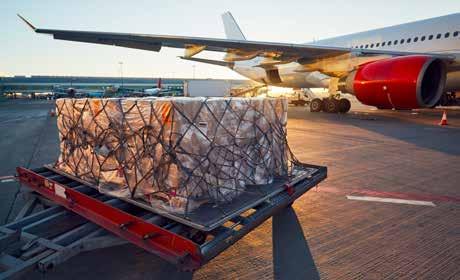
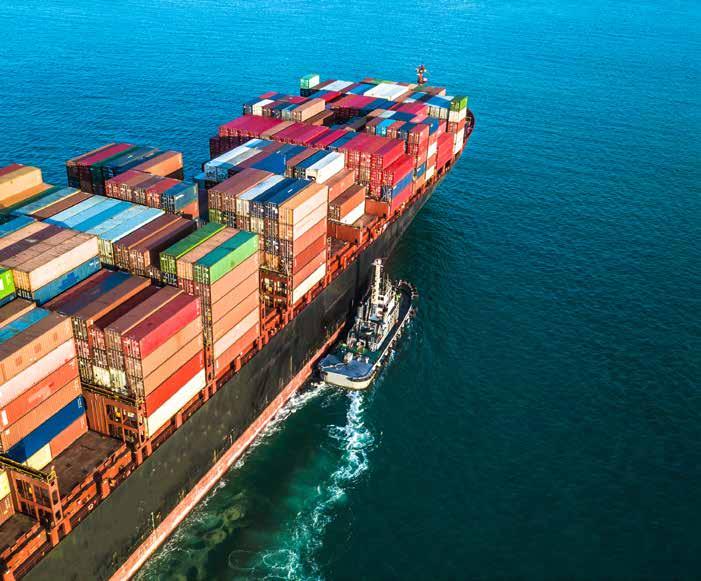
Gulftainer, the world’s largest privately-owned, independent port operator based in the UAE, has launched an interim and complimentary ‘Express Service Lane’ initiative to prioritise the delivery of medical supply consignments at its ports across the UAE.
The move is part of the company’s commitment to accelerating logistical procedures and fast-tracking the availability of medical supplies to consumers across the nation. Through this effort, Gulftainer seeks to support the preventive measures and national initiatives launched by the UAE government in combatting the COVID-19 pandemic.
As part of the initiative, Sharjah Container Terminal (SCT) is also actively encouraging customers to use its secured digital payment methods while benefiting from convenient and seamless online processing of transactions.
Speaking on the new initiative, Peter Richards, Group CEO, Gulftainer, said: “The prompt and efficient delivery of medical equipment and supplies plays a crucial role in ensuring the health of the nation – particularly during these unprecedented times when the world is battling a pandemic. The Express Service Lane enables our ports across UAE to expedite criti-
cal supplies and get them to the brave caregivers in the community in the shortest time possible.”
He added: “We are fully aligned with the government’s safety guidelines and have introduced additional precautionary health, hygiene and safety measures across all operations, including safe-distancing, sanitisation, and training and education for all operational staff. Our operational protocols have been enhanced to ensure maximum safety for all members of the logistics community including but not limited to vessel crewmembers, on dock labour, and truckers across the UAE.”
The majority of Airbus sites in Spain have joined forces to produce 3D printed visor frames, providing healthcare personnel with individual protection equipment in the fight against Covid-19. More than twenty 3D printers are working day and night. Hundreds of visors have already been produced and dispatched to hospitals close to the Airbus facilities in Spain. Airbus leverages a patented design to manufacture the visor frames, using PLA plastics.
“One of the reasons I love my job is the capability we have for advanced design and quick manufacture. Overnight, we have gone from making aerospace concepts to medical equipment. This genuinely makes a difference in the fight against the pandemic and I couldn’t be prouder of our teams working day and night on this Airbus project,” said Alvaro Jara, Head of Airbus Protospace, in Getafe, Madrid.
Despite the pause of the majority of production at Airbus’ sites in Spain following the
Royal Decree of 29 March, Airbus employees are allowed on site to continue with this essential activity.
In addition, Airbus in Germany also joined the project. The Airbus Protospace Germany and the Airbus Composite Technology Centre (CTC) in Stade, together with the 3D-printing network named “Mobility goes Additive,” are now supporting this project in Spain, also coordinating the collection and transport of visors to the Madrid region.
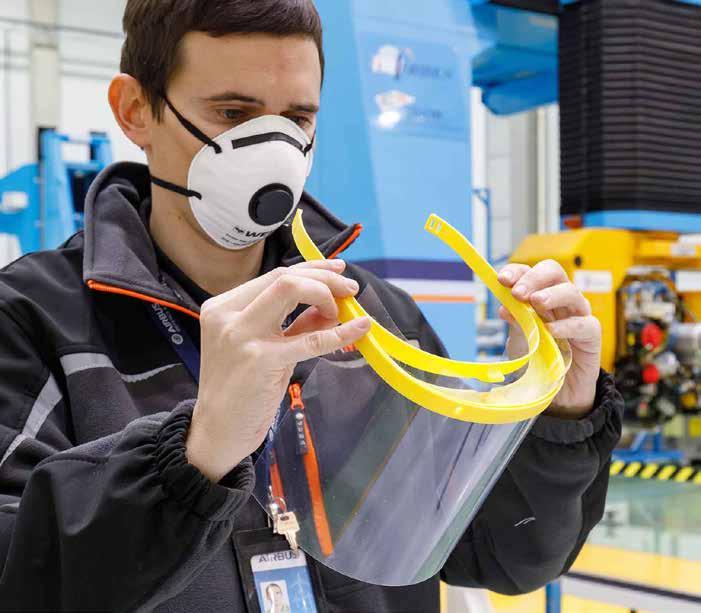

In an exclusive to Logistics News ME, Pervaz Moosakutty – General Manager, Premier Logistics, told us how the company is overcoming the challenges posed by COVID-19
The current Health Pandemic (COVID-19) has created quite a few challenges – measures that had to be put in place in double quick time, paramount being the safety of our staff, operational hurdles that had to conveyed to our clients and how the organization would work around new ways of doing things but ensure that we continue to operate as efficiently as possible.
The key success to any organization is the strength and resilience of the employees. And that was our priority. It was the message we wanted to convey internally that the health and well-being of our team was top priority and no
compromises on that count. Firstly we wanted to re-assure them that there would be no layoffs or redundancies, secondly how we protect them and even convey to their family and friends of re-assurance and positivity during the difficult days that might lie ahead. They key to that also was following the UAE Government guidelines and regular notifications that came across for safety and well-being of all residents.
Protective equipment, ensuring adequate supplies of basic medical tools such as gloves, masks and sanitizers was immediately made available throughout the 3 sites that we operate from and also the basic hygiene standards that visitors must adhere to.
In addition we started to roll out Work from Home schedules for the teams that emphasized
on staying at home and protecting the society. From an operational standpoint even though there has been a slight decrease in the volumes we see more inquiries and additional volumes that have come on board due to certain restrictions worldwide. Our Freight team has also been busy with quite a few charter inquiries for medical equipment. We have also reached out to our clients to reassure them that we will take that extra effort to ensure that their business continues to operate as smoothly as possible and kept our key personnel on standby in case of any emergencies.
This crisis will in future help us understand how we adapt to change and certainly best practices that we need to endure for ourselves, organizations and society at large.
As most retail stores are temporarily closing and restaurants are decreasing their walk-in capacity, outlets are forced to adjust their business model by turning to deliveries, in order to maintain a revenue stream during the COVID-19 pandemic.
Entities such as One Click Delivery Services –one of the fastest growing regional technology companies specializing in delivery – is currently experiencing a sharp spike in demand for fleet and fleet software management in order to respond to their client’s high demand of food and groceries orders.
“We are experiencing an unusual surge of demand on our fleet and digital solutions by our existing and new partners. We are honored to take on the responsibility of helping companies maintain business activity. More importantly, from a public health standpoint, all citizens’ essentials are delivered to their doorstep while they keep themselves and their families safe.” Hassan Hallas, CEO and co-founder of One Click Delivery Services
Since isolation and social distancing have become crucial, companies such as One Click Delivery Services are striving to keep the economy going. Currently offering technology solutions and fleet to some of the largest F&B and e-commerce names in the market, One Click Delivery Services has now increased its fleet capacity by 14% since the beginning of March 2020 and taken on multiple new clients across all industries.
With deliveries of groceries, food, drugstore products, e-commerce, courier, banking and telecom; One Click Delivery Services reaches a wide customer base and caters to most needs.
“It is important to remain as positive and proactive as possible during this challenging period, which is why we intend on going above and beyond to support our clients, to avoid them experiencing the financial impact of having to stop or ‘slow down’.” Ayush Khatri, Corporate Strategy Director at One Click Delivery Services
As customers’ and employees’ well-being becomes a top priority, One Click Delivery Services has implemented stringent hygiene protocols in line with the Ministry of Health and Family Affairs to avoid contamination. Some of the measures taken include obliging fleet drivers and riders to wear gloves and masks – and changing them multiple times throughout the day – continuous sanitization of hands as well as deep cleaning of cars, vans and motorbikes.
In addition to hygiene protocols, One Click Delivery Services now strictly deliver goods through the ‘knock-and-drop’ method – meaning that drivers knock on the customer’s door and drop off the package, taking several steps back in order to avoid any contact with the customer. Fleet riders and drivers are instructed to handle packages from certain angles, to avoid the overlapping of hand placement on them with customers. One Click Delivery Services’ hygiene measures are constantly revisited as public health remains a critical priority.
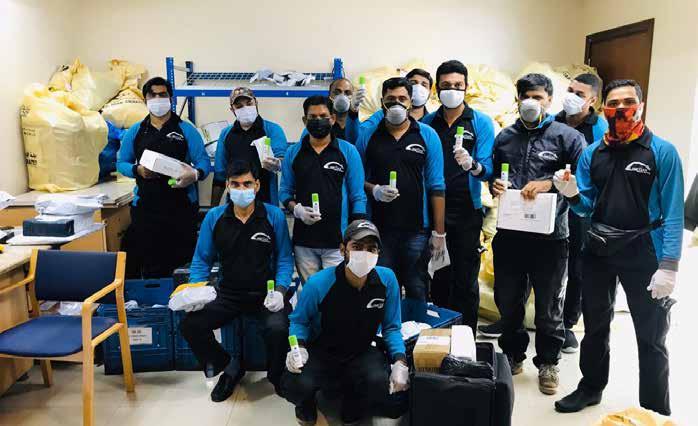
Kory W. Thompson, Country Head Middle East for Regus’ parent company IWG, tells us why cutting the work commute could be your company’s single biggest green step in 2020

Did you know that by helping people work closer to where they actually live, the average flexible workspace location saves 118 metric tonnes of carbon each year? Globally, this adds up to 2,560,000 tonnes per year – the same as 128,000 flights between London and New York.
According to recent research by UBS, one in five people cut down on the number of flights they took last year. Sustainability has moved to the forefront of people’s minds and mounting evidence shows there’s a clear environmental gain to be made by cutting out the daily office commute.
Flexible working is fast becoming a new norm, but some businesses have yet to embrace it. Professionals are less inclined to commute anymore, and this hardly comes as a surprise. Commuting has been a sore topic for decades, but most have simply accepted it as the only way to land the best

jobs with the best companies.
Thanks to the increasingly digital nature of many jobs, the need for many of us to commute to an HQ on a daily basis is being called into question. According to the Roads and Transport Authority (RTA), 594 million passengers used public transportation in Dubai in 2019.
This includes the Dubai Metro, Dubai Tram, public transport buses, and marine transportation, electronic reservation vehicles, smart rental vehicles and taxis. This is an increase of 5 million passengers, compared to 589 million passengers in 2018, and shows the growing reliance on transport networks in the UAE.
There’s a real opportunity to use the rise of remote and flexible working as a chance to challenge the status quo - and significantly reduce the business carbon footprint, while also stripping out other inefficiencies. Reduc-

ing emissions by cutting commutes is just one way that opting for flexspace can contribute to a greener workspace. In essence, flexspace helps companies rethink their approach to leasing workspace because they only consume and pay for the resources they need.
This mirrors the UAE’s 2030 Agenda for Sustainable Development that aims to provide better living conditions to all. Controlling emissions is a key step to combat climate change and its impact, and the UAE is engaged in the fight against climate change as a priority target to maintain the country’s sustainability and growth.
Furthermore, the National Environmental Education and Awareness Strategy 2015-2021 is encouraging the active involvement of businesses and industries in moving towards environmental sustainability at the workplace.
Fortunately, flexspace helps companies optimise office use. Unlike conventional of-
fice space – in which a set amount of square footage is leased for a set amount of time, with flexspace, businesses can choose to upscale or downsize the number of desks in line with changes to their staff numbers, so there’s no need to pay for unused resources. And by sharing reception areas, kitchens and business lounges with other tenants in the same location, companies split the costs of leasing and maintaining the facilities. Using workspace more intelligently in this way significantly reduces the amount of wasted electricity and water, which not only minimises a company’s environmental impact but also its expenses.
Innovations in green architecture keep coming, and today’s generation of office buildings is increasingly built with sustainability in mind. In future, carbon-neutral workspace will become the ideal, with smart materials and biophilic design at the heart of construction. This is another advantage the
majority of flexspace locations offer over conventional office space: they tend to be newer and more modern, containing facilities purposefully designed with forward-thinking, environmentally-conscious businesses in mind.
Employers speak volumes about their commitment to sustainability through the ecofriendliness of their everyday operations, which is becoming increasingly important in the eyes of employees too. Therefore, office space that helps staff keep their carbon footprint to a minimum could become key to talent retention.
Building flexspace into a client’s office portfolio is a big step towards reducing their impact on the planet. Rather than compromising on quality, it’s about finding win/ win situations that create much-needed efficiencies – streamlining processes and ending habits that are fast looking dated. And perhaps the two-hour daily commute should be the first thing to go.

Steve Cockerell, Director Industry Marketing – Road and Rail, Bentley Systems on how China Railway Sets Benchmark for Full-lifecycle BIM on Beijing-Zhangjiakou Rail Project

As part of China’s national railway construction initiative, and in preparation for Beijing to host the 2022 Winter Olympics, the Beijing-Zhangjiakou high-speed railway is being constructed in the Hubei province of northeast China. The CNY 53.5 billion, 174-kilometer long railway will become the world’s first high-speed rail line with a design speed of 350 kilometers per hour. It will reduce travel time between the two city venues for the Olympic Games from three hours to 50 minutes. With 71 subgrade sections, 64 bridges, 10 tunnels, and 10 stations, including the world’s deepest and China’s largest underground station at Badaling, the new high-speed line will be the first in China’s rail industry to adopt a full-lifecycle BIM strategy for all disciplines involved in the project.
China Railway Engineering Consulting Group (CEC) was responsible for preliminary and detailed design and construction consult-
ing. Setting a goal to establish a benchmark in the railway industry, the company committed to using innovative technology methods to optimize design and construction and achieve fulllifecycle BIM on the world-class high-speed rail project. With 23 main engineering disciplines and 56 design sections, the team faced many challenges on this complex project. The project presented significant and changing environmental conditions in a high-altitude area amid surrounding cultural infrastructure that required complicated structural solutions. To optimize design, efficiently coordinate the project, and implement effective 3D collaborative design and construction processes, CEC needed integrated digital design applications.
To facilitate coordinated design and engineering processes, CEC selected Bentley technology to establish an open, connected data environ-
ment (CDE). “We are facing big problems in collaboration, so we want to find an amazing platform that is easy to use, provides a uniform data storage format, and supports collaborative work,” said Zhongliang Zhang, director of BIM at CEC. Based on ProjectWise and Bentley’s integrated design applications, the team created logical links between and within the different disciplines, providing real-time access to trusted information wherever and whenever required. CEC relied on ProjectWise as the common platform and implemented innovative BIM methodologies using MicroStation, OpenBuildings Designer, and OpenRoads Designer to optimize information exchange. The integrated software solution allowed the team to create a component library to standardize design and dynamic modeling that could be centrally managed at all stages, in the same digital collaboration environment, and in accordance with the same standards.
Using Bentley’s CDE with a unified underly-
ing data structure optimized exchange and integration of the various data types across the different engineering specialties involved, resulting in rapid model development. The connected digital solution significantly improved work efficiencies for the teams involved, with CEC using Bentley software to create a coordinated environment to enable multidiscipline design and collaboration, as well as to improve the quality of generated deliverables.
CEC utilized Bentley applications, advancing 3D BIM capabilities in a CDE for coordinated design solutions to overcome the numerous site constraints. Importing high-speed rail specifications into OpenRoads assisted designers in determining industry-compliant design elements and establishing a standard basis for design. Bentley’s diversified modeling capabilities and data representation optimized geological design mapping and developed standardized structural components for the bridge and track. Given the architectural complexities of Qinghe Station and the excavation difficulties of the Badaling Station and tunnel, CEC worked with Bentley to maximize the digital potential of BIM workflows and to optimize design through automation, consistency, and intelligent processes.
“In general, applying Bentley BIM modeling provides a simple and efficient process and helps us take the first step in BIM design,” Zhongliang said. Through automated, standardized, and intelligent collaborative design methods, CEC went beyond the first step, advancing the capabilities of BIM to deliver innovative, coordinated railway design and lay the foundation for construction operation and maintenance, for full-lifecycle BIM processes.
To realize multidiscipline design, CEC used Bentley’s integrated technology to develop 3D collaborative BIM processes, standardizing data structure for modeling and design purposes, and streamlining workflows. The company used the software to perform altitude calculations and 3D model integration in accordance with China Railway Engineering standards. The parametric modeling features facilitated efficient change management and automated 3D model generation, optimizing design while shortening modeling times. Working in a CDE enabled real-time unobstructed access to and exchange of project
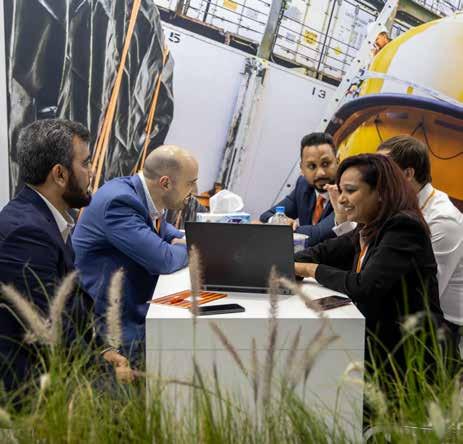
information. The common file format facilitated collaboration across all disciplines and reduced data transfer costs and risk throughout all phases of design.
More specifically, CEC resolved design and layout issues with pipelines and underground structures and reduced geological modeling time by six months compared to traditional methods. Using Bentley’s applications for 3D multidiscipline design coordination and modeling resulted in optimized land use during construction and reduced environmental impact while still meeting the railway’s technical requirements. The collision detection features identified design errors prior to construction, which enhanced design accuracy, reduced rework, improved efficiencies, and eliminated costs associated with on-site construction changes. Overall, Bentley’s collaborative digital solution saved three months in design time and CNY 3 million.
Based on Bentley’s CDE, CEC is using the Beijing-Zhangjiakou high-speed railway project
as an opportunity to verify and approve current BIM standards and set a benchmark for fulllifecycle BIM within China’s rail industry. By exploring 3D design across multiple professions and verifying the feasibility of Bentley’s BIM design capabilities for all railway design specialties, the CEC team reduced the environmental impact of the project and improved the efficiency and quality of the design and deliverables. Advancing the application of BIM technology in the planning and design phases of railway initiatives, CEC relied on the flexibility and interoperability of Bentley software to facilitate coordinated modeling of the complex tunnels and stations and lay the foundation for BIM processes during construction, operations, and maintenance. “The Beijing-Zhangjiakou intercity railway is of great guiding significance to other BIM projects in the railway industry’s future,” Zhongliang said. “By using Bentley’s technology, China Railway Engineering Consulting Group is working toward realizing intelligent construction, equipment, and operation and is the start of a new era for the world’s intelligent railway.”

